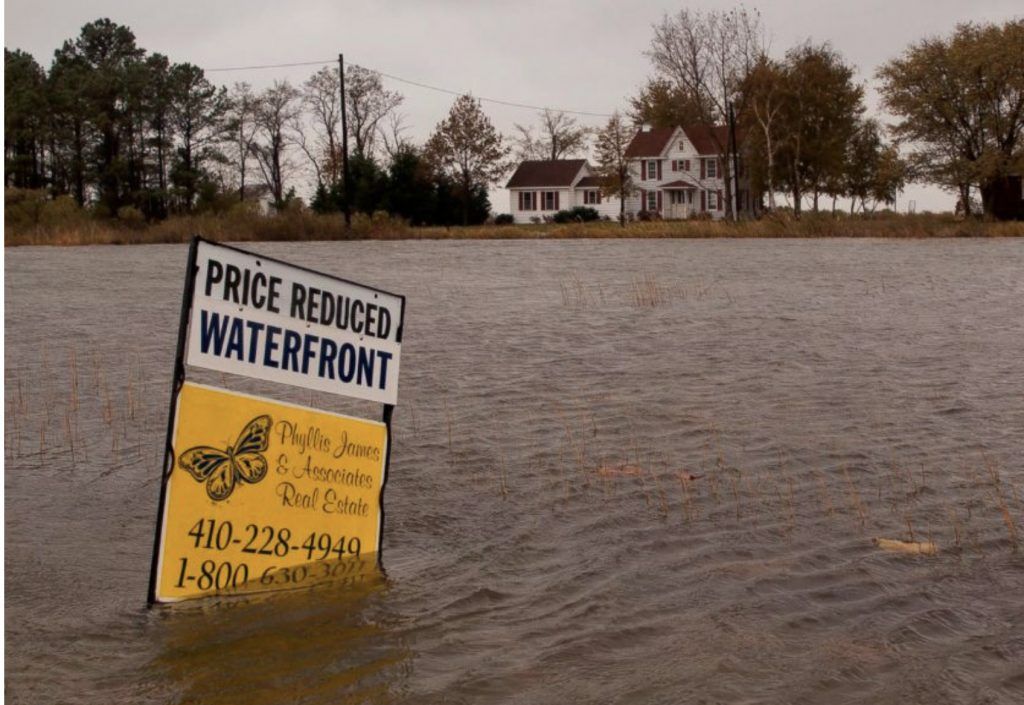How climate change could trigger recession
By Dawn Stover | October 8, 2019
 Image courtesy of Union of Concerned Scientists, “Underwater: Rising Seas, Chronic Floods, and the Implications for US Coastal Real Estate 2018.”
Image courtesy of Union of Concerned Scientists, “Underwater: Rising Seas, Chronic Floods, and the Implications for US Coastal Real Estate 2018.”
As sea level rises and precipitation patterns change, many communities are facing an increasing risk of flooding. But it’s not just homes and businesses that may be underwater. Some experts are warning that climate change could cause a “housing bubble” collapse that precipitates the next recession.
Risky mortgages are what started the 2008 financial crisis. It began with rapidly inflating real-estate prices, fueled by lenders who gave high-interest loans to home buyers with weak credit histories. When house prices reached unsustainable levels, many buyers found themselves “underwater”—owing more than their homes were worth. They began defaulting on their loans and the housing bubble abruptly collapsed, triggering a banking emergency that developed into a full-blown global recession. More than a decade after the crisis, debt levels are still elevated.
Something similar could happen again. Because of climate change, the risk of catastrophic hurricanes and other extreme weather is rising. At the same time, homeowners are purchasing less flood insurance than in the past, putting themselves at increased risk of defaulting on their mortgages. A study published last week suggests that banks have responded to major hurricanes and other billion-dollar disasters by selling some of their riskier mortgages to Fannie Mae and Freddie Mac, mortgage associations backed by the federal government.
As the Washington Post reported a few days ago, “Fannie Mae, Freddie Mac and the Federal Housing Administration guarantee almost $7 trillion in mortgage-related debt, 33 percent more than before the housing crisis, according to company and government data.” The increase in government exposure means that taxpayers will be left holding a bigger ball if loan defaults spike. “In 2019, there is more government-backed housing debt than at any other point in U.S. history, according to data from the Urban Institute,” the Post reported.
The climate risk to the housing market has echoes of the subprime mortgage crisis, according to a recent report in the New York Times. As one of the authors of the new study told the Times, between $60 billion and $100 billion in new mortgages are issued for coastal homes each year.
Publication Name: The New York Times
To read what we're reading, click here
Together, we make the world safer.
The Bulletin elevates expert voices above the noise. But as an independent nonprofit organization, our operations depend on the support of readers like you. Help us continue to deliver quality journalism that holds leaders accountable. Your support of our work at any level is important. In return, we promise our coverage will be understandable, influential, vigilant, solution-oriented, and fair-minded. Together we can make a difference.
Keywords: mortgages, recession
Topics: Climate Change, What We’re Reading
















Today the Federal Reserve Bank of San Francisco warned that home values could fall significantly because of climate change, and banks could stop lending to flood-prone communities. https://www.nytimes.com/2019/10/17/climate/federal-reserve-climate-financial-risk.html